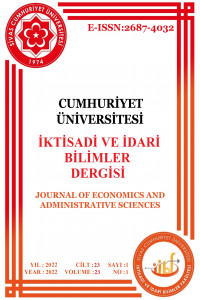Finansal Gelişme ve Ekonomik Büyüme, Enerji Tüketimini Nasıl Etkilemektedir; 5 Türk Cumhuriyeti için Panel VAR Analizi
Öz
Bu çalışmada, beş Türk Cumhuriyeti için (Türkiye, Azerbaycan, Kazakistan, Kırgızistan ve Tacikitan) enerji tüketimi, finansal gelişme, doğrudan yabancı sermaye ve ekonomik büyüme değişkenleri arasındaki ilişki 1992-2017 dönemi verileri kullanılarak incelenmiştir. Çalışmada 5 Türk Cumhuriyetinde enerji tüketimini etkileyen değişkenleri incelemek amaçlanmıştır. Ekonomik büyüme, doğrudan yabancı sermaye yatırımı ile banka mevduatı, özel krediler ve likit yükümlülükler olmak üzere 3 farklı finansal gelişme indikatörü de kullanılarak Panel VAR metodu uygulanmıştır. Analiz sonuçlarına göre finansal gelişmenin göstergelerinden biri olan banka mevduatındaki artış enerji talebini olumlu etkilerken, özel kredilerdeki artış enerji talebini negatif etkilemektedir. Diğer taraftan enerji tüketimi artışı finansal gelişme üzerinde negatif bir etkiye sahiptir. Ekonomik büyüme enerji tüketimi ilişkisi incelendiğinde, enerji tüketimindeki artış ekonomik büyümeyi pozitif etkilerken, doğrudan yabancı sermaye yatırımları enerji tüketimi ile tersi bir ilişkiye sahiptir. Nedensellik sonuçları, enerji tüketimi ile likit yükümlülükler dışındaki tüm değişkenler arasında çift yönlü nedensel bir ilişkiyi desteklerken, enerji tüketiminden likit yükümlülüklere doğru tek yönlü bir nedensel ilişkiyi desteklemektedir. Enerji tüketimi, doğrudan yabancı sermaye yatırımı ve likit yükümlülüklerdeki artışlar ekonomik büyümenin itici gücüdür. Ama enerji tüketimindeki artış ekonomik büyümeyi olumlu etkilerken, finansal gelişmeyi olumsuz etkilemektedir. Bu yüzden dışa bağımlılığı azaltmak, yenilebilir enerji kaynaklarına ve enerji etkin teknolojilere yönelmek, finansal piyasalardaki enerji maliyetlerini azaltarak, kısa döneme nazaran uzun dönemde ülke refahını artıracak faktörlerdir.
Anahtar Kelimeler
Enerji tüketimi Ekonomik Büyüme Finansal Gelişme Türk Cumhuriyetleri
Kaynakça
- Abrigo, M. R. M., and Love, I. (2016). Estimation of Panel Vector Autoregression in Stata. The Stata Journal: Promoting Communications on Statistics and Stata, 16(3), 778–804.
- Aslan, A., Apergis, N., & Topcu, M. (2014). Banking development and energy consumption: Evidence from a panel of Middle Eastern countries. Energy, 72, 427-433.
- Bekhet, H. A., Matar, A., & Yasmin, T. (2017). CO2 emissions, energy consumption, economic growth, and financial development in GCC countries: Dynamic simultaneous equation models. Renewable and Sustainable Energy Reviews, 70, 117-132.
- Chang, S. C. (2015). Effects of financial developments and income on energy consumption. International Review of Economics & Finance, 35, 28-44.
How does Financial Development and Economic Growth affect Energy Consumption;The Panel VAR Analysis of 5 Turk Countries
Öz
In this study, the linkage among energy consumption, financial development, foreign direct investments and economic growth in 5 Turk’s countries (Turkey, Azerbaijan, Kazakhstan, Kyrgyz Republic and Tajikistan) were examined during the 1992-2017 observation period. Panel var methodology was applied by using 3 different financial development indicators. According to analysis results, the increase in bank deposits, which is one of the financial development indicators, positively affects the energy demand, while the increase in private loans negatively affects the energy demand. On the other hand, energy consumption increases have a negative impact on financial development. When the economic growth and energy consumption relation are examined, the increase in energy consumption affects economic growth positively, foreign direct investment has an inverse relationship with energy consumption. The causality results suggest that there is two-way causality between energy consumption and all other variables except liquid liabilities, and there is one-way causality running from energy consumption to liquid liabilities. An increase in energy consumption, foreign direct investments and, liquid liabilities are the drivers of economic growth. However, although the increase in energy consumption has a positive effect on economic growth, it has a negative effect on financial development. Therefore, reducing foreign dependency and turning to renewable energy sources and energy-efficient technologies will reduce energy costs on the financial market and increase the welfare of the country in the long run.
Anahtar Kelimeler
Energy Consumption Economic Growth Financial Development Turkic Countries
Kaynakça
- Abrigo, M. R. M., and Love, I. (2016). Estimation of Panel Vector Autoregression in Stata. The Stata Journal: Promoting Communications on Statistics and Stata, 16(3), 778–804.
- Aslan, A., Apergis, N., & Topcu, M. (2014). Banking development and energy consumption: Evidence from a panel of Middle Eastern countries. Energy, 72, 427-433.
- Bekhet, H. A., Matar, A., & Yasmin, T. (2017). CO2 emissions, energy consumption, economic growth, and financial development in GCC countries: Dynamic simultaneous equation models. Renewable and Sustainable Energy Reviews, 70, 117-132.
- Chang, S. C. (2015). Effects of financial developments and income on energy consumption. International Review of Economics & Finance, 35, 28-44.
Ayrıntılar
| Birincil Dil | İngilizce |
|---|---|
| Konular | Ekonomi |
| Bölüm | Araştırma Makalesi |
| Yazarlar | |
| Yayımlanma Tarihi | 14 Ocak 2022 |
| Gönderilme Tarihi | 19 Kasım 2021 |
| Yayımlandığı Sayı | Yıl 2022 Cilt: 23 Sayı: 1 |
Cumhuriyet Üniversitesi İktisadi ve İdari Bilimler Dergisi Creative Commons Atıf-GayriTicari 4.0 Uluslararası Lisansı (CC BY NC) ile lisanslanmıştır.

